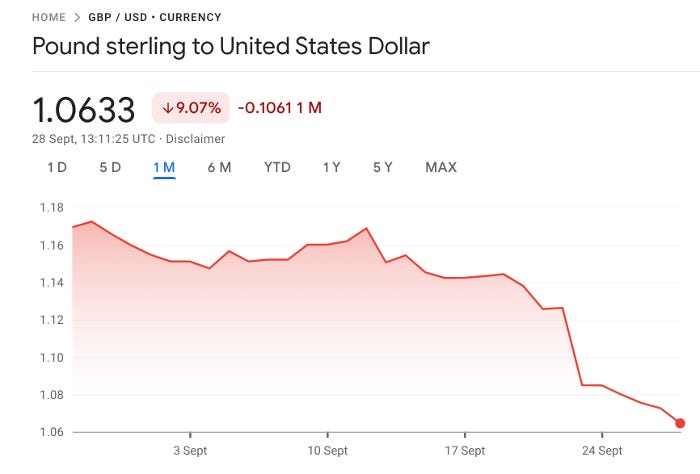How low can you go?
This week: the Truss government breaks records, and also the economy. Also, my Labour conference highlights, and some thoughts on Liverpool.
The iron law of the modern Conservative party is that each iteration of this government will contrive, somehow, to be worse than the last. The Truss ministry is barely three weeks old – a week and a half if you include the national mourning blackout – yet has already managed to trigger a national crisis that would have felt unthinkable just days ago.
On Friday, the man who is still, at time of writing, chancellor, Kwasi Kwarteng, unveiled his “mini budget”, finally putting all the ideas he’s been working on for years into practice, and instantaneously crashed the pound. On Monday it hit a record low. On Tuesday, mortgage lenders stopped lending en masse and the IMF directly attacked the government. On Wednesday morning, at 11am, the Bank of England announced it was going to start buying government debt in an attempt to calm everybody down. We are halfway through the week.
Spot the budget. Image: Google.
Elsewhere, the government is engaging in all sorts of oddly voter-repellent behaviour, from announcing plans to trigger earthquakes by fracking marginal seats to refusing to ban the import of foie gras and mink. And, with Truss making no effort whatsoever to placate those backbenchers who did not support her, rumours already abound of letters expressing a loss of faith in her leadership, which, you’ll remember, has yet to last a month. Perhaps the 1922 Committee, like the BBC, plans to mark its centenary, but instead of some special programming and an episode of Doctor Who it’ll simply launch its second leadership election in a year.
My guess, for what little it’s worth, is that at some point Truss throws Kwarteng under the bus for doing what she wanted him to do, thus signalling a change of direction and giving everyone a reason to pretend that the Prime Minister herself is not the problem. Kwarteng has been in post for only 23 days; if he goes in the next week, he will be the shortest-lived chancellor in modern British history.1
I’m not going to the Conservative Conference in Birmingham next week (their experimental attempts to charge journalists £100 for attendance annoyed me so much that I forgot to finish the form, and by the time I remembered it was up to £800, so screw that). This is a shame, as I suspect it’ll be an absolutely fascinating festival of wild panic and open civil war, and I’m genuinely sad not to see it.
I have, however, been in Liverpool for Labour. I long ago lost track of how many of these things I’ve been to – this might be the 12th – but the vibe at this one is different from any I can remember. Shadow ministers are talking about policies as though they’re something they’re actually going to get to do, not merely the latest move in a factional chess game. Events have the logos of brand name tech firms slapped on their signage. People can and will question the ethical dimension of such sponsorship – but it highlights the feeling that, for the first time in a dozen years, power might finally be shifting towards the Labour party once again.
All of which goes to show what an odd game politics is: the worse things get, the better some people’s prospects.
One slight worry is that I have dim memories of at least some of this optimism around the Labour conference c2014.
Another, rather bigger one is we’ve got to survive the winter, yet. And it’s only Wednesday.
Keep reading with a 7-day free trial
Subscribe to The Newsletter of (Not Quite) Everything to keep reading this post and get 7 days of free access to the full post archives.



